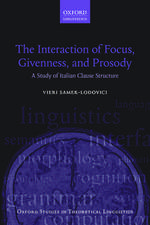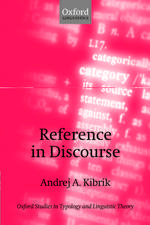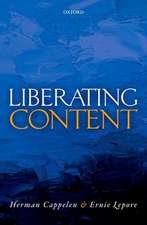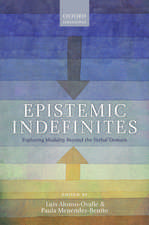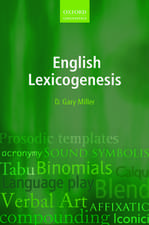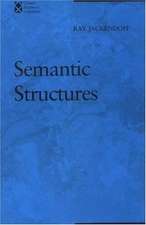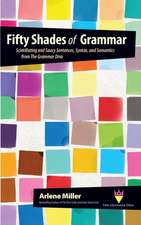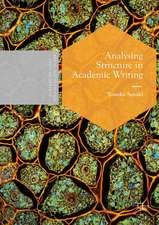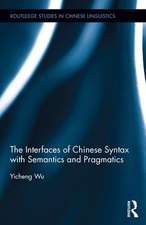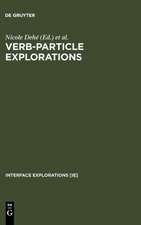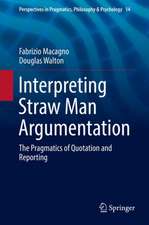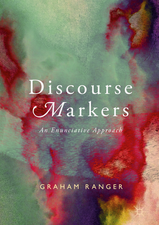A User's Guide to Thought and Meaning
Autor Ray Jackendoffen Limba Engleză Paperback – 2 apr 2015
| Toate formatele și edițiile | Preț | Express |
|---|---|---|
| Paperback (1) | 132.20 lei 31-37 zile | +101.31 lei 4-10 zile |
| OUP OXFORD – 2 apr 2015 | 132.20 lei 31-37 zile | +101.31 lei 4-10 zile |
| Hardback (1) | 108.64 lei 31-37 zile | |
| Oxford University Press – 23 feb 2012 | 108.64 lei 31-37 zile |
Preț: 132.20 lei
Preț vechi: 139.90 lei
-6% Nou
Puncte Express: 198
Preț estimativ în valută:
25.30€ • 26.48$ • 21.05£
25.30€ • 26.48$ • 21.05£
Carte tipărită la comandă
Livrare economică 20-26 martie
Livrare express 21-27 februarie pentru 111.30 lei
Preluare comenzi: 021 569.72.76
Specificații
ISBN-13: 9780198736455
ISBN-10: 0198736452
Pagini: 288
Dimensiuni: 179 x 234 x 15 mm
Greutate: 0.44 kg
Editura: OUP OXFORD
Colecția OUP Oxford
Locul publicării:Oxford, United Kingdom
ISBN-10: 0198736452
Pagini: 288
Dimensiuni: 179 x 234 x 15 mm
Greutate: 0.44 kg
Editura: OUP OXFORD
Colecția OUP Oxford
Locul publicării:Oxford, United Kingdom
Recenzii
Ray Jackendoff is a monumental scholar in linguistics who, more than any scholar alive today, has shown how language can serve as a window into human nature. Combining theoretical depth with a love of revealing detail, Jackendoff illuminates human reason and consciousness in startling and insightful ways.
Ray Jackendoff has an uncanny ability to ask interesting and pressing questions. Anyone interested in language and thought should ask such questions. The asking itself is the primary intellectual act - that, and of course the ordering of the asking, which is by no means obvious and constantly problematical, as he well knows and kindly informs the reader. As for providing answers, pivotal questions may have answers, but they are complex and never simple and thus require extremely careful expression. In his effort to treat his readers in a way that is warm and friendly, he sometimes employs phrases ("kind of," "sort of," "well, like," and other things relaxed speakers tend to say) which I do not find essential, but which for others will surely have the effect of making the issues clear and comprehensible.
Clear and concise. The pace is perfect: very short chapters making for a very enjoyable read ... As an introduction to a cognitivist perspective on linguistic meaning and thought, this is an extremely helpful book in both tone and content.
Ray Jackendoff has an uncanny ability to ask interesting and pressing questions. Anyone interested in language and thought should ask such questions. The asking itself is the primary intellectual act - that, and of course the ordering of the asking, which is by no means obvious and constantly problematical, as he well knows and kindly informs the reader. As for providing answers, pivotal questions may have answers, but they are complex and never simple and thus require extremely careful expression. In his effort to treat his readers in a way that is warm and friendly, he sometimes employs phrases ("kind of," "sort of," "well, like," and other things relaxed speakers tend to say) which I do not find essential, but which for others will surely have the effect of making the issues clear and comprehensible.
Clear and concise. The pace is perfect: very short chapters making for a very enjoyable read ... As an introduction to a cognitivist perspective on linguistic meaning and thought, this is an extremely helpful book in both tone and content.
Notă biografică
Ray Jackendoff is Seth Merrin Professor of Philosophy and Co-Director of the Center for Cognitive Studies at Tufts University. His books include Semantics and Cognition (MIT 1983), Consciousness and the Computational Mind (MIT 1987), The Architecture of the Language Faculty (MIT 1997), Foundations of Language (OUP 2002), Simpler Syntax (with Peter Culicover, OUP 2005), Language, Consciousness, Culture: Essays on Mental Structure (MIT 2007), and Meaning and the Lexicon: The Parallel Architecture, 1975-2010 (OUP, 2010). He is the 2014 recipient of the David E. Rumelhart Prize, the premier award in the field of cognitive science.


